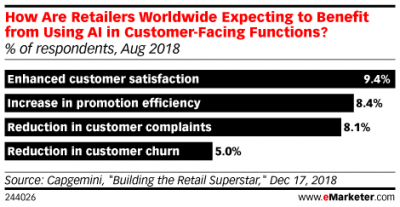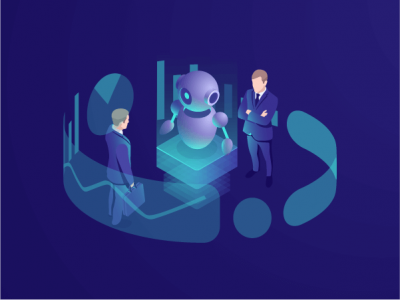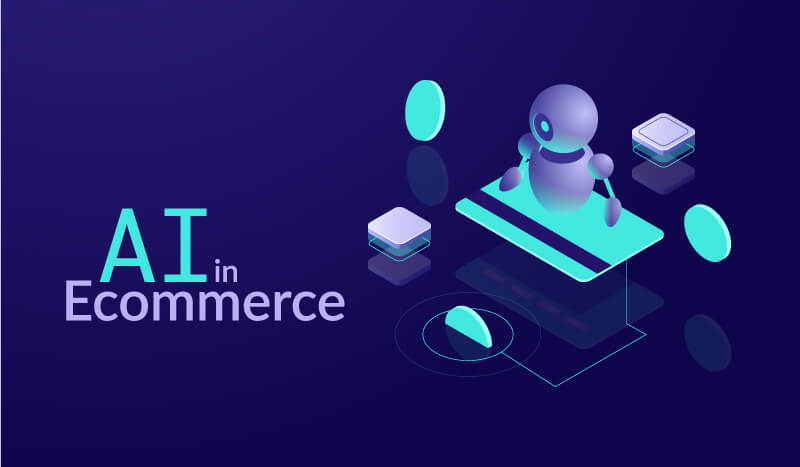AI in Ecommerce
Leading eCommerce firms are exploring how AI can improve competitiveness and customer satisfaction. Online purchases are now the standard method of buying goods and services. To stay competitive, ecommerce stores need to modernize with the latest technology trends. Advancements in AI help stores increase customer satisfaction and automate business processes.

Gartner Predicts shows improving customer metrics as a major driver of AI in ecommerce. Other areas include improved search, personalization, inventory management, and automation.
Let’s check out the top 10 ways AI will impact Ecommmerce.
1. Decrease Cart Abandonment
-
Automated emails
-
Personalized content
-
Lead scoring of customers likely to convert
2. Better Search Results
-
Contextualized and personalized search
-
Relevant and accurate results
-
Results tailored to the user
3. Voice and Image Search
Voice search is also becoming mainstream. It lets customers search for items without the need for a laptop or phone. AI analyzes voice searches using NLP to figure out what the customer is asking for. More and more homes are equipping voice activated assistants without screens. To reach those customers, ecommerce stores will have to incorporate voice search.
-
Customers can shop without computer or phone
-
NLP helps analyze customer questions
Multivendor marketplaces like eBay are using image search with great success. Shoppers can share a picture of an item via social media, phone pic, or image URL into the eBay search bar. They then get product results that match the image. Powerful AI uses color, shape, and size to determine products that best match the shared image.
-
Shoppers can search by sharing a picture
-
AI matches the image to products for sale
Ready to add AI to your store? Start today!
Need help getting started? We’re here to discuss your business requirements.

4. Better Target and Re-target Specific Customers
-
Marketing automation and AI collect buyer data
-
Display relevant content at the right time
-
Target those most likely to purchase
-
Re-target visitors across websites, search engines, and apps
5. Chatbots, Customer Service, and Virtual Shoppers
By 2020, customers will manage 85% of their relationship with the enterprise without interacting with a human.
[/fusion_testimonial][/fusion_testimonials]-
Provide 24/7 support and instant response
-
AI extracts important concepts from text
-
User data and buying behavior help provide relevant answers
6. Inventory management
-
Stock exactly what you need
-
AI analyzes past performance of products
-
AI provides quantitative forecasts for stock levels
-
Calculate carrying costs
-
Track seasonal trends

Build your AI enabled store today!
Need help getting started? Our AI experts are standing by to assist.
Artificial Intelligence in logistics helps to map out the most efficient delivery routes. This decreases delivery times and increases customer satisfaction and efficiency. Logistics facilities and warehouses use AI to improve processes and times. Robots conduct tasks normally done by a human workers, all controlled by the AI data. This reduces employee overhead by eliminating human positions. Customer satisfaction increases as they receive their products fast and on time.
-
Find the most efficient delivery routes
-
Improve logistics facility and warehouse efficiency
-
Reduce overhead
-
Get products to customers fast
8. Personalization
Every ecommerce shopper has an existing online presence, profile, and purchase history. As they shop, the system gathers more data about their behavior and preferences. AI then crunches this data to provide personalize ads and content that lead the user to convert. Shoppers see the content they want to see, at the right time, in the format they prefer. As the system gathers more and more data about a particular user, it can learn how to better reach them.
-
AI uses online personal data to recommend products
-
Show shoppers personalized ads, content, and promotions
-
Show content at the right time, in the right format
9. Recommendation engines
Recommendation engines use customer data, buying behavior, and brand preferences to recommend products. Netflix uses artificial intelligence to provide a list of movies and TV shows to watch. Recommendations use data from your profile, watch history, and other personal data. Amazon also uses recommendation engines to show you products you may buy. Recommendations for ecommerce include: matching products, products that come together, and bundled products.
-
Recommendation engines suggest products based on online user data
Get started with AI in ecommerce today.
Shuup AI experts are here to help bring your idea to life.

10. Localization
Localization let’s any ecommerce store appear local to each visitor. Artificial intelligence collects and analyzes visitor data to determine their location. It then shows ads and other content that are relevant to the customer’s location. This makes it seem personal to the user. AI tracks trends in the data for different locations. It can predict the best content to display, at the right time for each location.
-
Appear local to every international user
-
Show ads and content relevant to the location
-
Track location trends
Future of AI in Ecommerce
AI is here to stay. It will continue to improve ecommerce stores, user interaction, and conversion rates. With AI advancements, the need for human input into ecommerce sales processes decreases. Ecommerce stores may some day be running themselves. Store owners will enjoy more sales and better customer satisfaction with a tailored AI solution.






